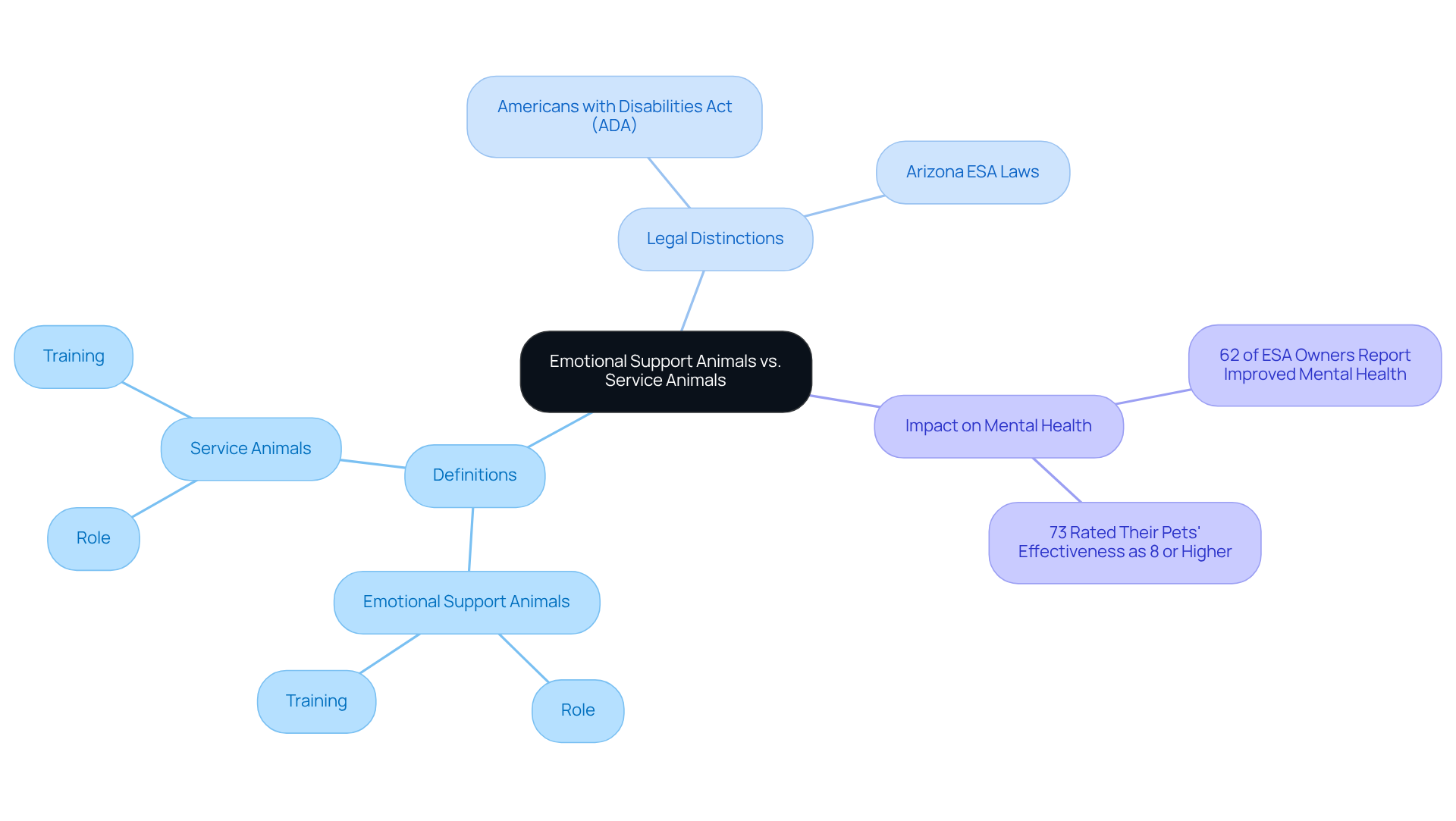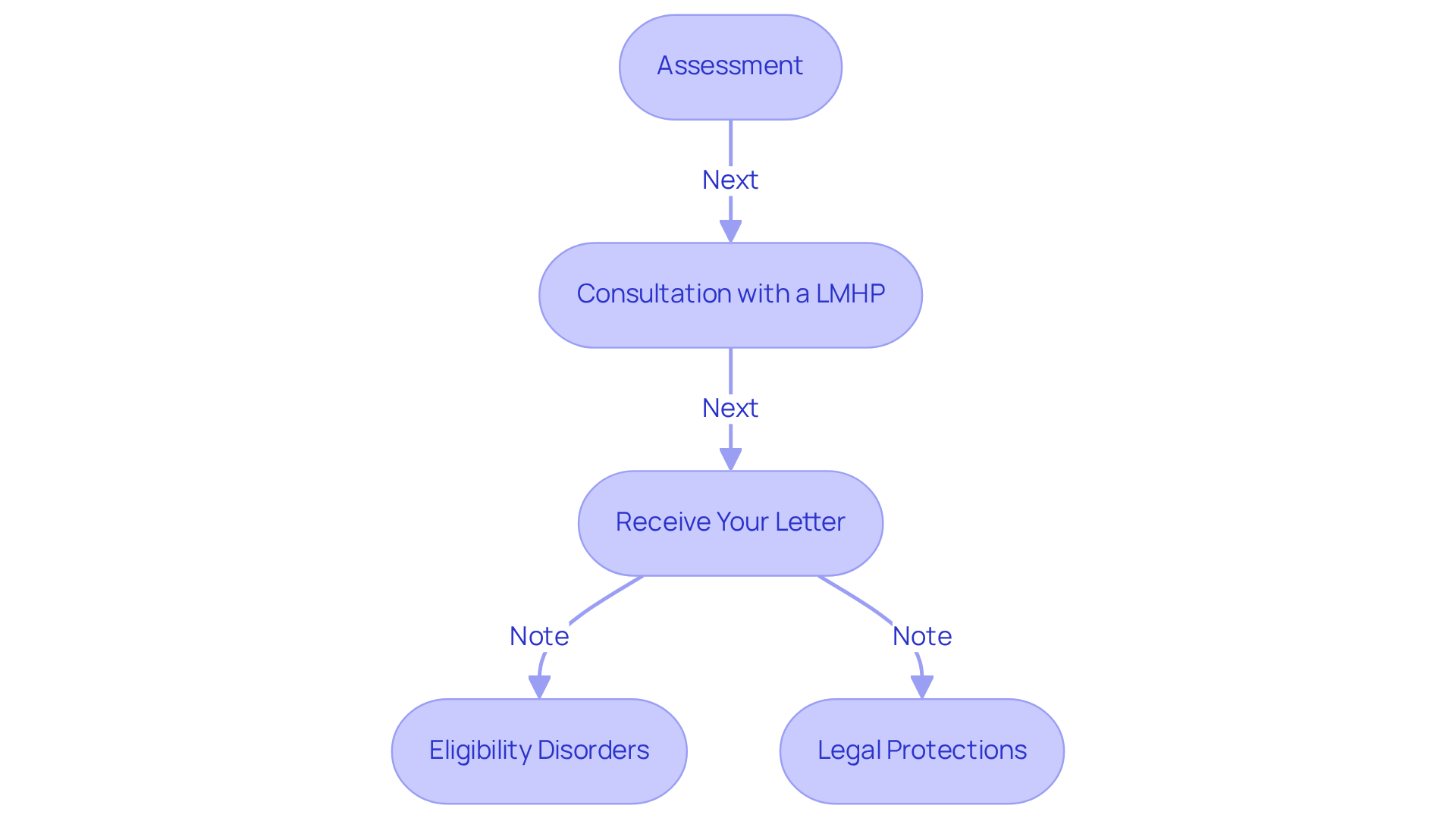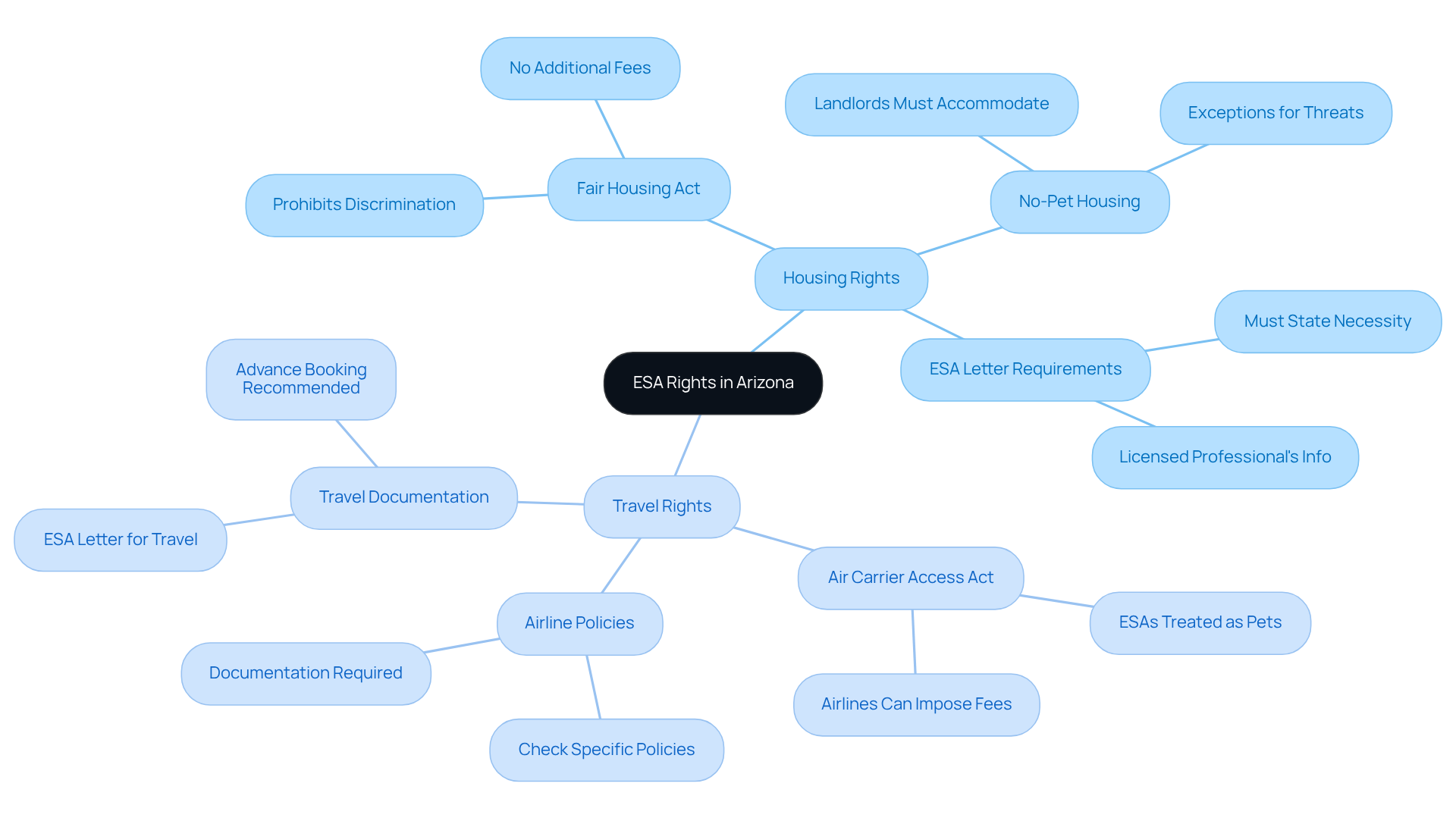

Navigate Arizona ESA Laws: Your Essential Guide for Support Animals
by Lena Park
Last updated: August 26, 2025
Verified and Approved by:
Angela Morris,
MSW, LCSW
Fact Checked

Overview
This article serves as a compassionate guide to navigating Arizona’s laws regarding Emotional Support Animals (ESAs). It highlights the important legal distinctions between ESAs and service animals, along with the protections offered under the Fair Housing Act (FHA).
Individuals facing mental health challenges often struggle to find suitable housing, and ESAs provide critical emotional support, allowing them to live in no-pet housing without incurring extra fees. However, it is essential to understand that ESAs do not possess the same public access rights as service animals.
This distinction is crucial for ESA holders in Arizona as they navigate their rights and limitations. By recognizing these differences, individuals can feel more empowered and informed about the support available to them.
Introduction
Navigating the landscape of emotional support animals (ESAs) can be a complex journey, especially in Arizona, where specific laws govern their rights and access. Many individuals face emotional challenges that can feel overwhelming, and understanding the legal distinctions between ESAs and service animals is crucial.
These differences can significantly impact one’s ability to secure housing and travel with their supportive companions. As awareness of ESAs grows, so too do the challenges associated with their legal status, raising important questions about the rights of ESA holders in public spaces and the evolving regulations surrounding their care.
How can individuals ensure they are fully informed and equipped to advocate for their emotional support animals in this shifting legal environment? It’s essential to recognize that support is available, and with the right resources, individuals can feel empowered to navigate these complexities.
Define Emotional Support Animals and Their Legal Distinction from Service Animals
Emotional Support Animals (ESAs) provide essential companionship for individuals navigating the challenges of emotional or psychological difficulties. Unlike service animals, which are specifically trained to perform tasks for individuals with disabilities, ESAs do not require specialized training. It’s important to understand that under the Americans with Disabilities Act (ADA), only dogs and, in some cases, miniature horses qualify as service animals. This distinction significantly impacts the rights and access individuals have in various settings.
Legally, Arizona ESA laws primarily recognize ESAs under the Fair Housing Act (FHA), which allows individuals with these animals to reside in no-pet housing without incurring extra charges. However, it’s crucial to note that ESAs do not enjoy the same access rights in public spaces as service animals do. For example, while service animals can accompany their owners in any public area, ESAs lack the same legal protections, which can limit their presence in places like restaurants and stores.
Recent studies highlight the vital role ESAs play in enhancing emotional well-being, with:
- 62% of ESA owners reporting improved mental health during the COVID-19 pandemic, compared to just 19% of individuals without an ESA.
- An impressive 73% of ESA owners rated their pets’ effectiveness in improving mental well-being as eight or higher on a scale of ten.
This statistic underscores the significant impact these animals can have on emotional stability and reinforces their importance as therapeutic companions.
Understanding the legal distinctions between emotional support animals and service animals is essential for individuals aiming to navigate housing and public access challenges effectively, particularly under Arizona ESA laws. As awareness of the benefits of ESAs continues to grow, they are increasingly recognized as crucial components of mental health support, complementing traditional therapies and fostering emotional resilience. Remember, you are not alone in this journey; the support of an ESA can be a valuable part of your path to emotional well-being.

Explore Arizona ESA Laws and Regulations
In Arizona, individuals facing mental health challenges often encounter significant emotional hurdles, especially in relation to the Arizona ESA laws that govern housing for their emotional support animals (ESAs). The Fair Housing Act (FHA) plays a crucial role in protecting the rights of these individuals, allowing them to reside in pet-restricted housing without incurring additional fees or deposits. However, it’s important to acknowledge that landlords hold the right to deny ESA requests if the animal poses a direct risk to the safety or well-being of others. For ESA owners, possessing a valid ESA letter from a licensed mental care provider is essential, as this documentation safeguards their rights under the FHA.
The FHA explicitly prohibits discrimination against tenants with disabilities, including those who require emotional support creatures. Legal experts emphasize that landlords cannot impose extra fees or refuse to rent based on the presence of an ESA, making proper documentation vital. In recent years, the Arizona ESA laws have experienced a surge in requests, reflecting a growing recognition of the emotional support these animals provide to individuals navigating mental wellness challenges.
Wellness Wag understands the struggles faced by those seeking ESAs and offers a streamlined, affordable process for obtaining legitimate ESA letters through personalized consultations with licensed medical physicians. After submitting the necessary forms, clients are connected with a licensed medical doctor for a thorough evaluation to determine their eligibility for an ESA. Once confirmed, clients receive a professionally crafted ESA letter with legal recognition within 24 hours of their consultation, ensuring they have the documentation needed to protect their rights.
Real-life case studies illustrate the practical implications of the FHA concerning Arizona ESA laws. For example, one tenant successfully challenged a landlord’s refusal to accommodate their ESA, resulting in a ruling that affirmed the tenant’s rights under the FHA. Such outcomes highlight the importance of landlords understanding their obligations and tenants being aware of their rights.
While Arizona ESA laws may not have specific state provisions enhancing protections for emotional support animals, the federal framework provides essential safeguards for individuals seeking their companionship. If you find yourself in need of support, remember that help is available, and you deserve the comfort that an ESA can provide.

Outline the Process for Obtaining an ESA Letter in Arizona
Navigating the journey of mental health can be challenging, and for many, the support of an Emotional Support Animal (ESA) can make a significant difference. To obtain an ESA letter in Arizona, follow these essential steps:
-
Assessment: Begin with a brief online assessment to determine your eligibility for an ESA. This initial step typically takes just a few minutes and is a crucial first move toward finding the support you need.
-
Consultation: Schedule a meeting with a licensed mental wellness professional (LMHP) qualified to issue ESA letters. During this session, the LMHP will thoughtfully evaluate your mental well-being needs and assess whether an ESA is suitable for you. While the duration of this process may vary, experienced providers often complete it efficiently, ensuring you feel supported throughout.
Eligible disorders for an ESA letter include anxiety, depression, PTSD, and other mental health conditions.
- Receive Your Letter: If approved, you will receive your official ESA letter, typically within 24 hours. This letter must be printed on the professional’s letterhead and include their license number and signature. It serves as your main documentation for housing and travel arrangements, ensuring you can keep your emotional support companion close.
In Arizona, ESA laws recognize any form of domesticated creature, including cats, rabbits, and birds, as an emotional support animal. The increasing number of ESA letters being distributed highlights the growing acknowledgment of the therapeutic advantages these animals provide. Mental health professionals emphasize the importance of a thorough assessment to ensure that the ESA truly meets your individual needs.
It’s also important to understand that Assistance Animals are only allowed within the student’s bedroom in their assigned residence hall and are not permitted in shared spaces such as classrooms or dining areas. Furthermore, Assistance Animals must be fully house-trained and up to date on all vaccinations.
The Fair Housing Act offers legal safeguards for individuals with emotional support animals, ensuring that you can reside with your pets, regardless of landlord policies. Remember, you are not alone on this journey; there is support available to help you thrive.

Examine Housing and Travel Rights for ESA Holders in Arizona
In Arizona, individuals with Emotional Support Animals (ESAs) face unique challenges influenced by Arizona ESA laws that can feel overwhelming. Fortunately, the Fair Housing Act (FHA) provides essential protections, allowing ESA holders to reside in no-pet housing without incurring additional fees, in accordance with Arizona ESA laws. This means that landlords cannot deny housing solely due to the presence of an ESA, as long as a valid ESA letter is provided. This legal framework, particularly the Arizona ESA laws, is crucial for those navigating mental health challenges, ensuring they can access the support they need without facing discrimination. However, it’s important to understand that emotional support animals do not enjoy the same public access rights as service pets, which limits their ability to accompany their owners in public spaces like restaurants and stores.
When it comes to travel, the landscape for ESA owners has changed significantly due to amendments in the Air Carrier Access Act (ACAA). Previously, airlines were obligated to accommodate ESAs, but recent updates have shifted this responsibility, allowing airlines to classify ESAs as regular pets. As a result, ESA owners must now verify their airline’s specific policies prior to travel, as many airlines have begun to impose fees and restrictions akin to those for pet travel. For instance, travelers should be prepared to provide documentation and may need to secure their pet’s spot well in advance due to limited availability on flights.
Real-life stories highlight the positive impact of these regulations. Many ESA holders have successfully navigated no-pet housing situations by presenting their ESA letters, ensuring they can live alongside their beloved support animals without incurring extra costs. However, the evolving nature of travel rights means that ESA owners must remain informed and proactive to facilitate a smooth travel experience with their companions. Remember, you are not alone in this journey, and support is available to help you navigate these challenges.

Conclusion
Understanding Arizona’s Emotional Support Animal (ESA) laws is essential for those seeking the companionship of these important animals. Many individuals face emotional challenges that can feel overwhelming, and the presence of an ESA can provide crucial support. However, it’s important to recognize the legal distinctions between ESAs and service animals. While ESAs offer vital emotional support, they do not have the same public access rights as service animals. This understanding is key to navigating housing and travel challenges effectively.
The protections offered under the Fair Housing Act (FHA) are a beacon of hope for ESA owners. This law allows them to live in pet-restricted housing without incurring additional fees, provided they have a valid ESA letter. Obtaining this letter involves a compassionate consultation with a licensed mental health professional, ensuring that individuals receive the support they truly need. As travel regulations for ESAs continue to evolve, being informed about airline policies and requirements becomes increasingly important.
The significance of emotional support animals in enhancing mental well-being cannot be overstated. Their therapeutic benefits are becoming more recognized, encouraging individuals to advocate for their rights and seek the support they deserve. Have you ever felt the warmth of an ESA’s companionship during tough times? Whether navigating housing or travel, staying informed about Arizona ESA laws empowers individuals to enjoy the presence of their emotional support animals without unnecessary barriers. Remember, you are not alone in this journey, and support is available to help you thrive.
Frequently Asked Questions
What are Emotional Support Animals (ESAs)?
Emotional Support Animals (ESAs) provide companionship for individuals dealing with emotional or psychological difficulties. They do not require specialized training like service animals.
How do ESAs differ from service animals?
ESAs are not specifically trained to perform tasks for individuals with disabilities, while service animals are. Under the Americans with Disabilities Act (ADA), only dogs and, in some cases, miniature horses qualify as service animals.
What legal protections do ESAs have in Arizona?
In Arizona, ESAs are recognized under the Fair Housing Act (FHA), which allows individuals to live in no-pet housing without extra charges. However, ESAs do not have the same access rights in public spaces as service animals.
Can ESAs accompany their owners in public places?
No, ESAs do not have the same legal protections as service animals and may be limited in their presence in public areas like restaurants and stores.
What impact do ESAs have on mental health?
Recent studies show that 62% of ESA owners reported improved mental health during the COVID-19 pandemic, and 73% rated their pets’ effectiveness in improving mental well-being as eight or higher on a scale of ten.
Why is it important to understand the legal distinctions between ESAs and service animals?
Understanding these distinctions is crucial for individuals navigating housing and public access challenges effectively, especially under Arizona ESA laws.
How are ESAs recognized in the context of mental health support?
ESAs are increasingly recognized as important components of mental health support, complementing traditional therapies and fostering emotional resilience.
Certify Your Emotional Support Animal Today

Why You Can Rely on Us?
At Wellness Wag, we believe your pet deserves care rooted in both science and compassion. Each article is carefully researched, written in clear language for pet owners, and then reviewed by qualified professionals to ensure the information is evidence-based, current, and practical for real-life care. Our goal is to help you feel confident in making informed decisions about your pet’s health and well-being.
Reviewed by
Angela Morris, MSW, LCSW
Angela is a licensed clinical social worker with 20 years of experience in patient advocacy and community mental health. She has assisted numerous clients with ESA evaluations and brings a deep understanding of disability accommodations, ensuring that all information is accurate, supportive, and practical.

Written by :
Lena Park
Last Updated :
August 26, 2025












